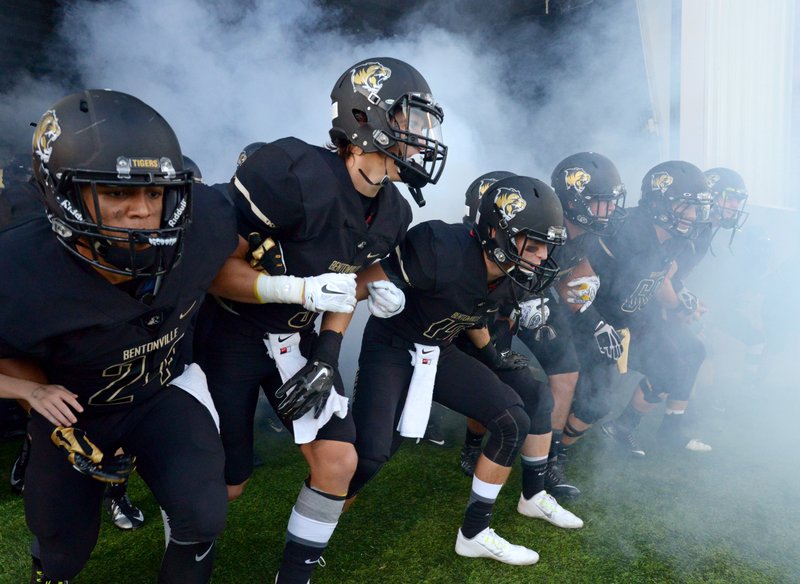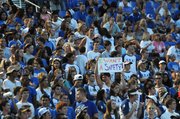Outside supporters and booster clubs account for about two-thirds of the nearly $2.7 million spent in 2014 on high school athletics in Northwest Arkansas' largest districts.
Only one of the four largest districts, Rogers, tracks all donations whether it's sponsorships, in-kind or proceeds from a booster club.
Booster club money
Below is financial information for the four booster clubs from the area’s six largest high schools that filed a Form 990, a return for a tax-exempt organization, with the Internal Revenue Service last year. Rogers High School and Heritage High School have new accounting in place and did not file with the IRS last year, but did file an annual report with the school district.
Group Total revenue Total expenses
The Springdale Red Dog Club$8,225 $9,363
Youth footballs scholarships for high poverty children: $6,650; equipment needs, $2,639; P.O. box fee, $74
Springdale Har-Ber Wildcat Club$89,645 $87,840
Food and travel for team and coaches, setup of arena for game day, $23,245; uniform replacement and maintenance for team, $15,277, equipment repair and replacement, $14,433
Fayetteville Athletic Booster Club $242,328 $215,227
Activities, $25,537; meals, $20,291; banquet, $16,985
Bentonville Athletic Booster Club$368,858 $208,230
Player support, $37,001; scholarships, $17,500
Rogers Mounties Athletic Booster Club$49,518 $44,188
Track/cross country championship rings and wind gauge, $10,496; scholarships, $10,000
Rogers Heritage Athletic Boosters$129,327 95,076
Scholarships, $9,000; Track/cross country rings, banquets and donation, $9,817; boys and girls basketball auxiliary gym scoreboards, $7,700
Source: Internal Revenue Service; school records
Bentonville, Fayetteville and Springdale have varying combinations of activity accounts, coach-led fundraising and booster clubs. They can't say exactly how much money is donated to a particular sport nor how it's spent.
"I can tell you from 26 years in public education that booster clubs differ in how they operate from school to school and activity to activity," said Mark Holderbaum, Rogers district athletic director. "One thing they share is they are all doing it to benefit the kids."
Districts that fail to track donations leave themselves vulnerable to claims they discriminate under the federal Title IX, said Sandra Pfau Englund, executive director of Parent Booster USA, which provides training and services to booster clubs across the United States. Title IX is the federal law prohibiting sex discrimination in any education program or activity that receives federal money.
Parents of three softball players filed a Title IX suit in July against the Fayetteville district.
A pitfall for groups doing their own accounting of donations is many fail to file required Internal Revenue Service forms, Englund said. Only four clubs from the area's six largest high schools filed last year with the IRS, which requires a Form 990 from those groups regardless of the amount of donations collected or money raised.
High schools in Bentonville, Fayetteville, Rogers and Springdale used $876,585 from school coffers last year to pay for athletics, while an additional $1.2 million came through activity funds controlled by the districts, according to school records. Booster clubs independently contributed another $587,798.
The Rogers School District tracks all outside funding by requiring all groups raising money throughout the year to submit year-end reports to school administration. The reports list activities conducted to raise money, the amount raised and how it was spent. The fundraising policy was adopted in 1998.
"It's an accountability factor not just for us, but for the whole community," Holderbaum said. "They are raising funds from community sources, and it's just part of our process."
All four of Northwest Arkansas' largest districts have accounts where people supporting a specific sport give directly to the school. Those accounts hold money from many sources including donations, sponsorships and money raised by team members.
Checks for these accounts must be made out to or donations given in the district's name. The district handles all the accounting.
Booster clubs typically handle their own finances, have boards and determine how to dole out money.
Rogers and Bentonville high schools have one athletic booster club each that represents all sports. Each individual sport may also have its own parent group raising money. That money goes into the school-run activity accounts.
Springdale and Fayetteville allow each sport to create its own booster clubs. Sometimes the groups are organized to raise money for boys and girls teams, such as track or golf.
Wayne Stehlik, director of athletics for Springdale Public Schools, said each of the district's two high schools have 14 sports, and each sport has the ability to create a booster club. Oftentimes those groups deposit money straight into school accounts.
"We have some sports that have them and some that don't," he said. "We leave it up to the coaches."
The only three sport-specific booster clubs that filed a Form 990 last year were football clubs from Fayetteville, Springdale High School and Har-Ber High, according to a search of the IRS database.
Alan Wilbourn, Fayetteville Public Schools spokesman, said there are clubs in Fayetteville for baseball, boys basketball, girls basketball, football, boys soccer, girls soccer, softball and wrestling with joint clubs for cross-country, golf, swim and dive, tennis and track.
Fayetteville officials declined to comment further about booster club activity because of the pending lawsuit.
Although people may think that donations cannot create a Title IX lawsuit, they are mistaken, Englund said.
"The schools don't control the boosters, but the schools accept the grants," she said. "It's not a dollar-for-dollar issue, but there has to be equal opportunities."
She said Title IX requires schools to make sure benefits, services, treatment and opportunities for boys and girls are equivalent overall and schools should make sure a donation doesn't disrupt the balance.
The Fayetteville lawsuit doesn't directly mention booster clubs, but claims the district favors boys teams with better funding, equipment, scheduling, locker rooms, training facilities, publicity and more experienced and higher paid coaches.
Last year's athletic budget shows the school allocated $11,450 to the baseball team and $9,000 to the softball team. Money deposited into the activity accounts were $4,300 and $1,000 respectively. Each team also has a booster club, but attempts to contact their presidents were unsuccessful, so it's unknown how much, if any, money they raised. A hearing is set in the case for 10:30 a.m. Dec. 2 in federal court in Fayetteville.
Trouble with the IRS is a risk many booster clubs don't even know they face, Englund said. Groups who handle their own accounting must file regardless of how much they raise. Nonprofit groups with gross receipts of more than $50,000 file a Form 990 or 990-EZ. Those raising less than $50,000 file a Form 990-N, also known as an e-Postcard.
If they have a nonprofit status, they must file a financial statement each year or face losing the tax exemption. The Internal Revenue Service reports 620,599 organizations automatically lost tax-exempt status since 2011.
Englund said groups that don't have nonprofit status are supposed to file a corporate tax return, but most just don't file at all.
Groups raising less than $25,000 had to start filing annual reports with the IRS following the passage of the Pension Protection Act of 2006.
"I don't think people are intentionally avoiding it; they just think they are parents helping their kids and don't understand the requirements," she said.
Ryan James, president of the RHS Mounties Athletic Booster Club, said the IRS recently approved the group's nonprofit application. He said to his knowledge this is the first time the club got 501c3 status.
"We had to redo our bylaws because of all the rules and regulations," he said. "We think that will make a big difference in our incoming donations."
Donations made to a 501c3 are tax deductible, said J. Christopher Harris, a partner with Rogers law firm Hatfield Harris. He's member of the Mounties booster club and prepared the nonprofit application.
He said the process is very detailed, and it can seem overwhelming if someone without the right knowledge tries to complete the paperwork.
"There are rules that have to be followed, but most of them are things they should be doing anyway," he said. "There are rules if you are a tax exempt organization or not. If someone is giving money and expecting it to go a certain place, the group is responsible to make sure it gets to the right place."
The Rogers Heritage Athletic Booster Club is also changing. Last year the group moved its finances under the Rogers Community School Recreation Association so it could use its tax-exempt status and accounting services.
"We really shifted the paradigm there," said Allen Brown, president of the Heritage club. All Heritage funds are kept in an account, so there's no co-mingling of funds, he said.
The change helped the club nearly double membership last year to about 110 members. Brown said the goal is to reach 400 members.
Bentonville's booster club faces the challenge of another high school next year. Scott Passmore, Bentonville athletic director, said the plan is to have one booster club for both high schools.
"Since we will be sharing facilities, it makes sense to share a club," he said.
Rogers kept one booster club the first year it had two high schools, with a main board and each school having its own group. Funds were split and each high school had its own club in year two.
Membership dues make up a large part of booster clubs' annual budgets. Memberships can run from about $20 for a basic membership up to several hundred dollars for additional benefits such as reserved seating at events. Bentonville, for example, sells individual memberships for $50 and has several levels to platinum that sell for $6,600. A $200 Mascot Level membership allows the booster to purchase up to four reserved football seats for $50 each.
All the large districts have reserved seating at football games to raise additional money, said Sam Hannon, president of the Springdale Har-Ber High School Wildcat Club, the football booster club. He said the booster club used to use seat sales as a revenue source, but decided to let the school run it and focus attention on other fundraisers such as selling discount cards from area businesses.
"We try to do big fundraisers to get 90 percent of the kids involved," he said.
Har-Ber also has an advertising company that provides discount space on a digital billboard the club can sell to football program supporters.
"When I go in and ask a business for booster club support, they often say they want to support both the schools' programs," Hannon said. "There's rivalry, but I want them both to be fully funded."
James said the Rogers Mounties booster club has few fundraisers and relies on income from membership dues and concession stand sales.
"The sports teams themselves do a ton of fundraising, and we would be asking the same supporters for money," he said.
Amy Johnson, president of the Springdale High School baseball booster club, said the group didn't want to keep going back to the same family and friends for money and has limited the fundraising to three main events each year.
Springdale baseball players and parents worked all summer parking cars at the Walmart Arkansas Music Pavilion in Rogers. The group also had a Tyson truck sale. Teammates will be doing a call-a-thon later this month.
Matt Breece, president of the Bentonville booster club, said his club relies on memberships and donations at two showcase events, Tiger Pride and Black and Gold. He said the band boosters run the concession stands.
What the clubs spend money on also varies widely, and award distributions range from less than $100 to near $1 million.
Booster clubs take equipment requests from coaches and work with the athletic directors. Hannon said weight room and editing equipment for film breakdown and a defibrillator for the training room are some recent donations from the Har-Ber football booster club. It also assists with meals and trips, such as the football team attending a camp last year at Auburn University.
"Our idea is we can be a revenue-producing program, not a revenue-taking one," Hannon said. "If we can take care of our program without being a burden on the district, it can spend money on other programs."
The Har-Ber High School Wildcat Club donated $62,215 to the football team least year, according to its IRS filing.
Scholarships and end-of-year banquets are also common recipients.
Breece said the Bentonville booster club group awarded $17,500 in scholarships last year.
"Seeing the success of our student athletes and seeing what types of benefits it gives them makes it worth the effort," he said. "Success breeds success, and they have done a real good job."
Clubs also help with facilities.
All donations for synthetic turf replacement at Bentonville's Tiger Stadium went through the booster club, making them tax-deductible. The total cost, $842,450, was raised through the club.
Stehlik created the Springdale Athletic Foundation to help with the district's larger athletic projects. He said Johnelle Hunt, local businesswoman and widow of trucking mogul J.B. Hunt, made a large donation for renovation of Jarrell Williams Bulldog Stadium. Money was also used for new seating at the Springdale High School gym.
The fund had $724,653 in it when the school filed its annual return with the IRS last year.
Sometimes facility and other team needs change as new parents or coaches enter the picture.
Springdale High School's baseball booster club stated last year it wanted an on-campus practice field, like Har-Ber High has. Both high school teams play home games at Tyson Park.
Johnson said the focus has shifted to making Tyson Park a better facility.
"We got a new coach last year, and in that year-and-a-half there has been a huge turnaround for us. There is a lot more pride in the program," she said. "We are spending money on field improvements and a total remodel of the locker room. We are creating a destination."
Zak Clark, first-year football coach at Springdale High School, said he's getting used to interacting with the booster club, which has provided much needed financial and volunteer support.
"We could not run our program without the support from the club," he wrote in an email.
NW News on 10/11/2015



